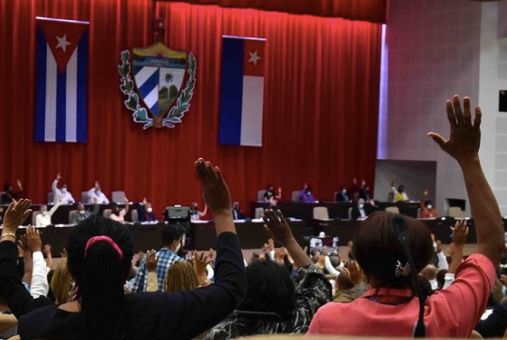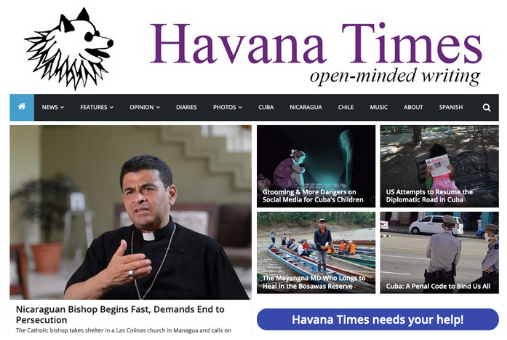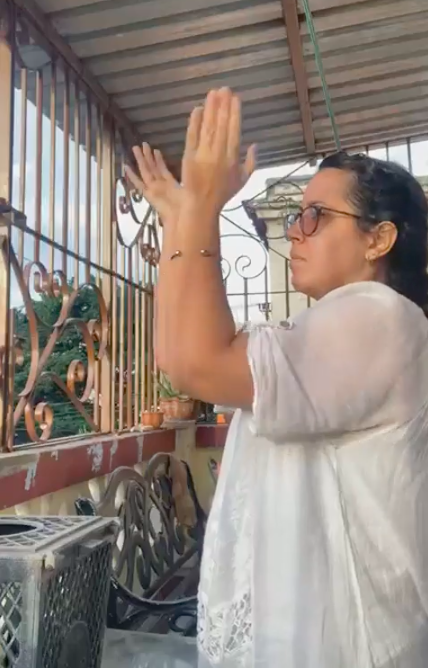By Marissa Galicia* and César López Linares
On May 15, 2022, Cuba’s National Assembly approved reforms to the Criminal Code that, according to experts, could criminalize even more the work of independent journalists in the island and allow the Cuban government to continue its attack on news reporting that is unfavorable to the government.
The approval of these reforms, which also prohibits independent news outlets from receiving foreign funding, puts journalists in imminent danger and leaves them searching for options on how to continue their coverage.
Independent media and journalism depend on foreign funding because Cuba only funds media that is run by the government and does not negatively portray it. Foreign funding includes aid from organizations outside of Cuba that support independent news outlets and journalists.

The amendments were approved at the Cuba's National Assembly on May 15th, and are expected to go into effect in 90 days. (Photo: Instagram of the Cuba's National Assembly)
“Most news outlets start out in Cuba, but then they edit the material outside of Cuba due to the government and internet issues,” Circles Robinson, editor of Havana Times, told LatAm Journalism Review (LJR). Havana Times is now edited in Nicaragua, but most of its journalists and contributors live in Cuba.
The multimedia platform of independent journalism elTOQUE is another example of the type of media that would be affected by these reforms. The site works through grants and funds from international initiatives such as the Velocidad Fund, MEEDAN and the International Fact-checking Network.
Similarly, the online magazine Periodismo de Barrio receives funding from foreign embassies of countries such as the Netherlands, Norway and Sweden in exchange for carrying out editorial projects, as stated on its financial transparency report.
Internet connectivity is another issue journalists face. Because the only internet provider in Cuba is run by the government, most sites are blocked. This means independent news sites are not easily accessible to Cuban citizens. To access independent Cuban media, citizens must use VPNs (Virtual Private Network), which are able to bypass restrictions.
“For now, people who use VPN can see what’s being written on the independent, alternative media. However, they [government and military] have very good surveillance,” Robinson said.
An alternative to VPNs are the “paquetes,” (packages) a terabyte of weekly content that can include news content, films, TV series, and books. The ‘paquetes’ are distributed hand-to-hand through external hard drives all over the country. Because less than 5% of Cuban homes have internet connectivity, paquetes are the next best thing.
“Every week, unidentified curators compile a selection of content and deliver it via a complex network of hundreds of distributors who, much like old-fashioned newspaper delivery boys, bring the paquete to the door of its subscribers,” wrote Emilio San Pedro of BBC News.
The Havana Times has not been restricted by the government, meaning Cubans can freely access and read its articles. The main reason it has not been blocked is because the government has not been able to track down where the funding is coming from, Robinson said. This way, the government has no way of knowing whether it receives foreign funding.
Apart from independent news sites being hard to access, Cuban citizens hardly use their very limited internet time to read news articles. “Internet time is limited, so people use it to find medicine on the dark web, like aspirin, or to communicate with family,” Robinson said.
Among the criminal code’s articles that could affect freedom of the press in Cuba are article 143, which specifically criminalizes any monetary value that could be used against the state.
According to that article, any person or organization, domestic or foreign, who “supports, encourages, finances, provides, receives or has in its possession funds, material or financial resources, with the purpose of paying for activities against the State and its constitutional order, is penalized by imprisonment from four to ten years."
“This article that directly attacks funding is closely related to something they have always accused us of, that we are mercenaries. Under the previous code, being a mercenary was described as a crime related to warlike or guerrilla actions, which of course did not apply to us,” Camila Acosta, Cuban correspondent for the Spanish newspaper ABC, told LJR. “Now it does, now this speaks specifically of actions that are financed to counteract the constitutional order. And we already know that, to them, anything, any criticism, is considered to be something that goes against the constitutional order.”
Article 185.1 stipulates prison sentences and fines to “whoever threatens, slanders, defames, insults or in any way affronts or offends, by word or in writing, in their dignity or decorum, a public official, authority or their agents or assistants, in the exercise of their functions or on occasion or because of them."

Access to digital news outlet The Havana Times has not been restricted because the government has not been able to track down where the site's funding is coming from. (Photo: Screenshot)
Similarly, according to Article 263.3, there is a penalty of three to eight years imprisonment for “public disorder,” which includes blocking public roads or access points, and invading facilities or buildings.
Under these precepts, dozens of journalists have been detained in recent years while covering demonstrations or protests against the Cuban government. One of them is Acosta, who was charged with "public disorder and instigation to commit a crime” last year, after covering the July 11 demonstrations in Havana.
Acosta and many other journalists were held under house arrest for several months, closely watched by members of the National Revolutionary Police (PNR).
“I think there are articles, and this is one of them, that respond directly to relevant events of social unrest or social protests that have taken place in Cuba in the last two years,” Acosta said. "I face charges of public disorder for the July 11 protest, but now the sanctioning framework has been raised and it has been made more explicit what is understood as a public disorder offense."
According to Cuban journalists, the government’s aim with the amendments approved on May 15 is to put an end to non-government media. They do not want anything negatively written about them. However, Cuban journalists have always faced pushback from the regime.
“The media have always been illegal (in Cuba),” Robinson said.
He added that the Cuban government has never been fond of any type of media or journalism, so the approval of this criminal code should not surprise many. Therefore, the consequences of journalists writing about the government are extensive.
“[The government] works like the mafia. They’ll have you arrested one day to interrogate you and play the nice guy, then threaten you the next,” Robinson said.
Besides being detained, another consequence of journalists doing their job is exile.

Journalist Camila Acosta was charged with public disorder and instigation to commit a crime last year, after covering the July 11 demonstrations. (Photo: Screenshot of a Facebook Live stream)
“They are given the option of exile, with a drive to the airport,” Robinson said. “The Cuban government is so against any type of negative press or reporting, that they kick people out of their own country.”
The Cuban government even raids newspaper headquarters to detain journalists who speak out against the government.
This is only one of many scare tactics used by the government to warn journalists and media outlets not to produce work that negatively portrays them.
Another scare tactic the Cuban government uses is denying journalists permission to leave the country.
“The government decides whether I go out or not. Obviously, I have asked permission several times and they have said no to all of them, and on other occasions they have not even responded to me,” journalist Abraham Jiménez Enoa told LJR in 2020.
Many journalists quit journalism and find a more traditional job in order to protect themselves and their families. Others leave the country forever while continuing to report, Robinson said.
“Many of our journalists at Havana Times have been activists in the journalism world and the pressure they receive causes them to leave the country and use pseudonyms,” he added.
Although independent journalism has always been considered illegal in Cuba, this was not explicitly stated in the law. The severity of the new criminal law is that the regime now has the legal tools to legitimize attacks on the independent press.
“Until now, independent journalists and activists had been punished for other crimes defined in the criminal code, such as public disorder, resistance or contempt,” Acosta said. “Until now, we operated outside the law, but there was no explicit law that made us illegal [...] Right now, the regime is counting on a tool that it had long needed to justify going against us. Of course, I am worried because it means an upsurge of repression.”
After the approval of the Cuban criminal code amendment, the Committee to Protect Journalists (CPJ) condemned the decision of the Cuban National Assembly and expressed great concern.
“Under the new criminal code, Cuban authorities continue to build an intricate and perverse legal regime of censorship. This deals a devastating blow to independent journalists and news outlets,” Ana Cristina Núñez, CPJ’s Latin American and the Caribbean senior researcher said in a statement issued on May 16.
The new criminal code is expected go into effect in 90 days.
—
This story was produced as an assignment for the class “Journalism and Press Freedom in Latin America,” at the University of Texas at Austin School of Journalism and Media.
* Marissa Galicia is a student at the University of Texas at Austin, where she studies International Relations and Global Studies, and Latin American Studies. Although she is not a journalism student, Marissa chose her major due to its focus on culture and world news.